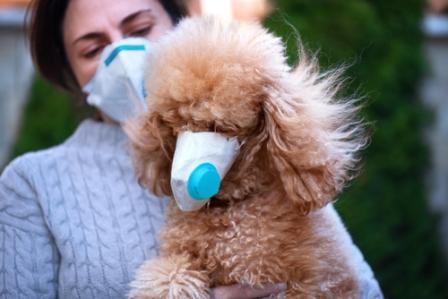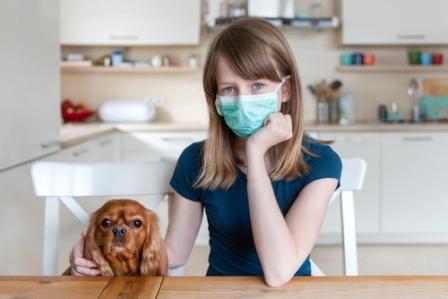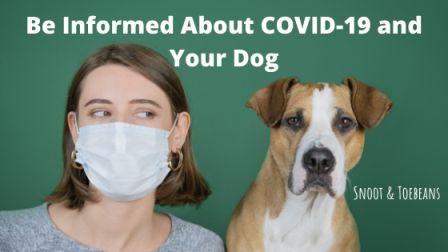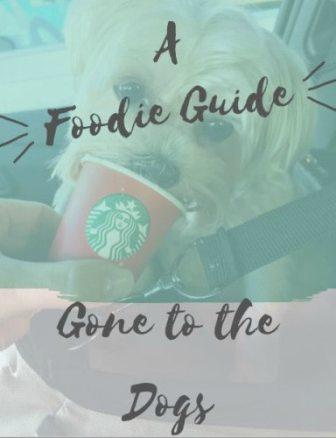Disclosure: My dog blog is supported by dog parents just like you. I only recommend products that I would use on my dogs. All opinions expressed here are my own. I sometimes earn a small affiliate commission, at no extra cost to you, when you click through the affiliate link and purchase something. You can read more about my affiliate policy here.

Have you seen the photos of dogs wearing face masks, similar to the one here? Do the photos cause you to believe COVID-19 in dogs exist?
I will be the first to admit that the photos are unnerving to say the least. However, dogs do not need a face mask to protect themselves against the novel coronavirus, COVID-19.
Nonetheless, as this coronavirus continues to spread, many dog parents are beginning to worry about COVID-19 in dogs. And, of course it is naturally alarming.
Even as I write this, research and testing are ongoing and variables still remain unknown. A novel virus, afterall, means one that has not been seen before. We have to keep in mind that this situation is ever-evolving with many different theories.
Firstly, What Are Coronaviruses?
Coronaviruses are a large family of viruses. These viruses can make both humans and animals sick. They have infected the human population before. You might remember them as Middle East Respiratory Syndrome (MERS) and Severe Acute Respiratory Syndrome (SARS).
Now, the human population is experiencing a new infectious coronavirus disease called COVID-19. So, yes there are a lot of unknowns we are facing as humans.
The lack of understanding paired with frequent misinformation is enough to put us all on edge. However, I want to inform you with what I’ve learned thus far regarding COVID-19 in dogs.
Should Dog Parents Worry About COVID-19 in Dogs?
Please, please keep yourself informed and other dog parents informed in order to not do something impulsive.
I am reading disheartening stories of dog parents who are surrendering their fur babies to shelters. Furthermore, some are abandoning them on country roads. Likewise, they are even “putting them down” from fear of their fur baby becoming infected. Even more so, fear that their fur baby will infect them.
With what is known, there is limited evidence to support risk of COVID-19 in dogs. Therefore, there is no justification in dog parents taking measures against their fur babies. It ultimately jeopardizes their welfare.
The Centers for Disease Control and Prevention, (CDC) has not reported any cases of COVID-19 in dogs.
“The CDC has not reported any cases of pets or other animals becoming infected with COVID-19 in the United States or anywhere else in the world, including hotbeds like Italy.”
Dr. Jerry Klein, Chief Veterinary Officer for the American Kennel Club (AKC)
Furthermore, there is no evidence that you are at risk from your dog, according to World Health Organization (WHO).
“While there has been one instance of a dog being infected in Hong Kong, to date, there is no evidence that a dog, cat or any pet can transmit COVID-19. COVID-19 is mainly spread through droplets produced when an infected person coughs, sneezes, or speaks. To protect yourself, clean your hands frequently and thoroughly.”
World Health Organization (WHO)
Can a dog be infected with “a” coronavirus? Remember, coronaviruses are a large family of viruses and can affect both humans and animals.
Does Canine Coronavirus Exist?
It is never talked about much, but interestingly enough, Canine Coronavirus does exist. It goes by the name CCoV. However, it is very different from the COVID-19 infection that humans are fighting right now.
CCoV is an intestinal infection that is highly infectious and affects dogs. It can cause a great deal of discomfort, but luckily it is short-lived. Humans can not be affected by CCoV.
Most cases of CCoV are caused by a dog or puppy coming into contact with infected fecal matter. In addition, the infection can be spread when a dog comes in contact with an infected dog. Contaminated food bowls can also spread the infection amongst dogs.
CCoV and Canine Parvovirus (PARVO), both cause diarrhea in dogs. Therefore, many people confuse the two with one another. However, PARVO is extremely deadly. Unvaccinated puppies are at greatest risk. PARVO is transmitted similarly to CCoV.
If your doggo continues diarrhea for 24 hours, has loss of appetite and is lethargic, contact your veterinarian.
COVID-19 Precautions Dog Parents Can Take
Health experts recommend that a person with COVID-19 limit contact with their pets and their families. While symptomatic, they should maintain separation from pets as they would any other household members.
In addition, if you are sick with COVID-19, avoid direct contact with your doggo. That is to say, no petting, snuggling, being kissed or licked, and sharing food.

When possible, have a designated family member care for the furry family members. In the event that you are quarantined alone with your pets, do this:
- wear gloves if possible, and, or
- wash your hands thoroughly before and after caring for your pets
- wear a facemask while interacting with your pets
Dr. Klein urges common sense best practices when it comes to our pets.
“If you have children, you wouldn’t have them touch a puppy and put their fingers in their mouth, because they can have fecal contamination,” he says. “The general practice of washing our hands after touching a puppy or a dog—that’s normal hygiene.”
Dr. Jerry Klein, Chief Veterinary Officer for the American Kennel Club (AKC)
Klein said not to focus on your dog contracting the virus or transmitting the virus, but instead — if you’re going to worry about something — worry about them being neglected if you get the virus.
“I think collateral damage would be the concern for my pets,” he said. “If I get sick, I want to make sure that they’re taken care of properly.”
Dr. Jerry Klein, Chief Veterinary Officer for the American Kennel Club (AKC)
In Conclusion
Bottom line, we are learning more every day about COVID-19. And, for now, rest assured there is no evidence that your doggo can get or spread this infection.
However, you do need to use caution and include your furry family member in your planning. Prepare as much as you can in the event you do get sick and have to enter quarantine. Think about things such as extra food and medications for your fur baby.
Furthermore, please help spread the word to other dog parents to research and get the facts. Abandoning their fur babies is something regrettable and absolutely unnecessary.
Hopefully this information has eased some of your anxiety about COVID-19 in dogs. Stay informed and don’t panic. Above all, enjoy some quality time with both, two-legged and four-legged family members.
For the latest updates and recommendations, please refer to the following reliable sources:
- World Small Animal Veterinary Association: Coronavirus and Companion Animals Advice
- World Organization for Animal Health (OIE): Questions and Answers on the 2019 Coronavirus Disease (COVID-19)
- U.S. Centers for Disease Control and Prevention (CDC): About Coronavirus Disease 2019 (COVID-19)
You might also be interested in learning more about dog heartworm prevention or food allergies in dogs.
What are your fears about COVID-19? Tell us about them in the comments below.


